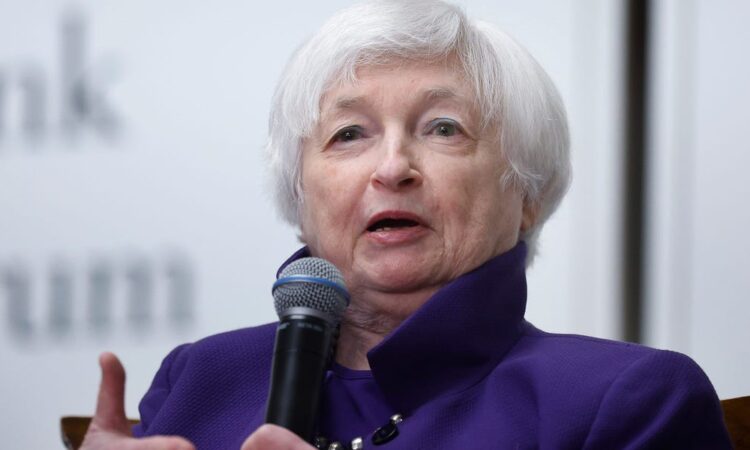
- US sanctions on Russia could threaten the dollar’s hegemony, Treasury Secretary Janet Yellen told CNN.
- But, it would be challenging to replicate the dollar’s dominance, Yellen added.
- The Chinese yuan is a competitor to the US dollar, amid Beijing’s big ambitions for the currency.
US economic sanctions on countries such as Russia could threaten the greenback’s global dominance, Treasury Secretary Janet Yellen told CNN Sunday.
“There is a risk when we use financial sanctions that are linked to the role of the dollar that over time it could undermine the hegemony of the dollar,” Yellen told CNN’s Fareed Zakaria in an interview. But the US only uses the dollar as a tool “judiciously,” she added.
“It is a very effective tool. Of course, it does create a desire on the part of China, of Russia, of Iran to find an alternative,” Yelled said.
But it’s not easy to replicate the eco-system that supports the US dollar, she said, adding that it would be challenging to replicate the currency’s dominance as the international reserve currency.
Yellen was responding to Zakaria’s question about reactions to the weaponization of the powerful dollar by the US administration.
Just last week, Brazilian President Luiz Inacio Lula da Silva lashed out at the dominance of the greenback and called on emerging nations to come up with an alternative currency for trade, the AFP reported on April 14.
One dollar-challenger is the Chinese yuan is emerging as a competitor to the US dollar, as Beijing has ambitions to make the currency the most dominant reserve currency in the world. But the yuan has a long way to go, mainly because Beijing still manages its value tightly. It also isn’t fully convertible to other currencies on the global market right now.
In February, the yuan overtook the dollar as the most traded currency in Russia.
In January, the US dollar dominated global trade, accounting for about 85% of trade finance, according to a February report from global payments system Swift. The Chinese yuan in comparison, accounted for just 4.6% of trade finance in the same period — but has more than doubled from 1.8% in February 2022, per Swift.
Swift derives its data from 11,000 financial institutions and corporations in more than 200 countries and territories.
Sweeping Western-led sanctions against Russia over the Ukraine war have also prompted Russian companies to use alternative currencies — such as the yuan, the Hong Kong dollar, and the UAE dirham — to trade.
In February, the yuan overtook the dollar as the most traded currency in Russia for the very first time, according to Bloomberg’s transaction data published on April 3. The trend continued in March, with the yuan pulling ahead of the dollar by an even wider margin. The Chinese currency’s trade volume in Russia was “negligible” before the war.
Just last month, Russian President Vladimir Putin told Chinese President Xi Jinping that Russia was ready to switch to using the yuan for foreign trade settlements, Russia’s RBC media outlet reported on March 21.
“The most important outcome of the Putin-Xi summit was perhaps the Russian commitment to mainly use yuan as foreign trade currency,” Steno Research, a Denmark-based research house, wrote in a March 24 report published on the Smartkarma research platform. “This is merely the last step in one of the major Chinese master plans – to let Shanghai replace New York as the world’s financial hub and center of pivot.”
Even so, Yellen is confident that the widely used dollar will continue to hold its own.
“We have very deep capital markets and rule of law that are central in a currency that is going to be used globally for transactions, and we haven’t seen any other country that has these institutional infrastructures that would enable its currency to serve a world like this,” she said.



